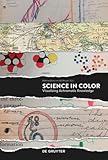Science in color : visualizing achromatic knowledge / Bettina Bock von Wülfingen (ed.).
Material type: TextPublication details: Berlin : De Gruyter, c2019.Description: 238 pages : illustrations (chiefly color), charts, facsimiles, maps, portrait ; 23 cmISBN:
TextPublication details: Berlin : De Gruyter, c2019.Description: 238 pages : illustrations (chiefly color), charts, facsimiles, maps, portrait ; 23 cmISBN: - 9783110604689
- 152.145 SCI
| Item type | Current library | Collection | Call number | Status | Date due | Barcode | |
|---|---|---|---|---|---|---|---|
 Books
Books
|
H.T. Parekh Library | SIAS Collection | 152.145 SCI (Browse shelf(Opens below)) | Available | K2752 |
Browsing H.T. Parekh Library shelves, Collection: SIAS Collection Close shelf browser (Hides shelf browser)

|

|

|

|

|

|

|
||
| 152.09 YOU Mind, brain, and adaptation in the nineteenth century: cerebral localization and its biological context from Gall to Ferrier / | 152.1 DEV Development of Intersensory Perception Comparative Perspectives / | 152.142 CAM Cambridge Handbook of Visuospatial Thinking / | 152.145 SCI Science in color : | 152.182 MON Touching: the human significance of the skin / | 152.188 GRE Beyond Biofeedback / | 152.4 AFF Affect theory reader |
Euro 33.95/-
Includes bibliographical references.
COLOR AND ITS MEANING FOR THE SCIENCES --
Color in Medical Images / Badano, Aldo --
Color as the Other? Absence and Reappearance of Chromophobia in Eighteenth-Century France / Boskamp, Ulrike --
Research on Color Matters: Towards a Modern Archaeology of Ancient Polychromies / Nagel, Alexander --
Do Signs Make Logic Colored? Tendencies Around 1900 and Earlier / Ramharter, Esther --
Coloring the Fourth Dimension? Coloring Polytopes and Complex Curves at the End of the Nineteenth Century / Friedman, Michael --
Encoding Color: Between Perception and Signal / Cedeño Montaña, Ricardo --
MEANINGFUL COLORS IN THE SCIENCES --
Green Is Refreshing: Techniques, Technologies and Epistemologies of Nineteenth-Century Color Therapies / Rossi, Michael --
Pigments, Natural History and Primary Qualities: How Orange Became a Color / Lawson, Ian --
An Evaluation of Color Maps for Visual Data Exploration / Baum, Daniel --
The Use of Color in Geographic Maps / Moser, Jana / Meyer, Philipp --
Historical and Scientific Note of Color Duplex Doppler Ultrasound and Imaging / Moreau, Jean-François / Pisano, Raffaele / Correas, Jean-Michel --
Diagrammatic Traditions: Color in Metabolic Maps / Wülfingen, Bettina Bock von --
Pink and Blue Science. A Gender History of Color in Psychology / Grisard, Dominique --
Image Credits --.
Color makes its way into natural science images as early as the research process. It serves for self-reflection and for communication within the scientific community. However, color does not follow a standard in the natural sciences: its meaning is contingent, even though culturally conditioned. Digital publishing enhances the use of color in scientific publications; at the same time, globalization promotes the idea of universal color symbolism. This book investigates the function of color in historical and current visualizations for scientific purposes, its epistemic role as a tool, and its long neglect due to symbolic and gender-specific connotations. The publication thus closes a research gap in the natural sciences and the humanities.
There are no comments on this title.


